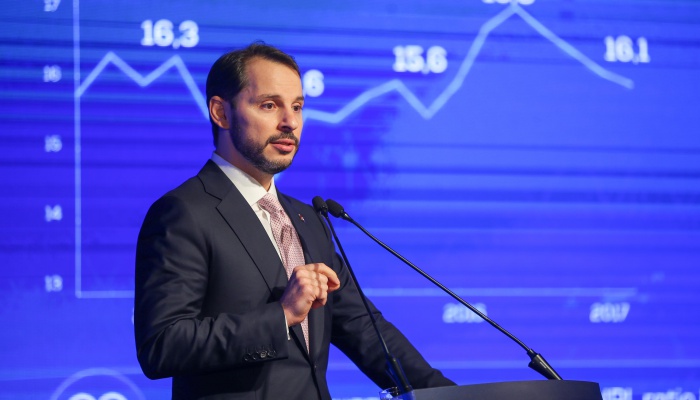Finance Minister Berat Albayrak, the son-in-law of Turkish President Recep Tayyip Erdoğan, quit his job on Sunday, citing health reasons, after his tumultuous two years and four months in office saw the lira lose more than 88 percent of its value against the US dollar.
Turkish media outlets rushed to compile recaps of Albayrak’s time in office, during which the Turkish currency depreciated nearly 181 percent against an ounce of gold and attempts to reduce inflation from double digits were botched.
First economy chief of new presidential system
Albayrak assumed the position of treasury and finance minister on July 10, 2018 after Erdoğan was reelected president in June. Erdoğan’s People’s Alliance formed by the Justice and Development Party (AKP) and the Nationalist Movement Party (MHP) also secured a parliamentary majority in snap elections announced months earlier.
The constitutional amendments of 2017, which transformed the country’s system of governance from a parliamentary to a presidential model, were enacted after the 2018 elections. Erdoğan had shrugged off criticism directed at the fact that he had appointed his son-in-law to such a critical post and claimed Albayrak, the former energy minister, could handle the country’s economic troubles.
“He [Albayrak] has both practical and theoretical experience in the finance sector. He worked successfully in the private sector. He recently taught this subject at Marmara University. Since he has this kind of background, I believe he will more quickly clean things up [with the economy] and do this job with success,” Erdoğan said at the time.
During Albayrak’s first month as finance minister, Washington hit Ankara with sanctions and tariffs over the imprisonment of evangelical pastor Andrew Brunson, a US citizen who had been arrested in October 2016 as part of a mass purge that targeted tens of thousands of Turkish military personnel, civil servants, educators, academics and journalists after a failed coup in 2016.
Turkey faced the worst inflation since 2003 following imposition of the sanctions, which targeted Justice Minister Abdülhamit Gül and Interior Minister Süleyman Soylu, and tariffs on Turkish steel.
Fall guy
Albayrak took the heat of the financial crisis, and the opposition criticized his inexperience as an economist as well as his family ties to Erdoğan, whose daughter had been Albayrak’s wife for 16 years.
Sound bytes from Albayrak’s speeches and interviews started to become widely circulated Internet memes. Social media users often mocked his presentation of the Turkish economy as a stable and growing enterprise with the surfacing of bad news about inflation or the plummeting currency.
When confronted during an interview with journalist Ahmet Hakan from the CNN Türk about the steep fall of the Turkish lira against US dollar, Albayrak brushed off criticism, saying there was nothing to worry about: “First, let me ask you this; Are you getting your salaries in dollars? Do you owe money in dollars? Do you have any business in dollars?”
2020 crisis
The lira has hit a series of record lows against hard currencies since the beginning of the year, and investors are worried about the risk of rising inflation as the central bank in October raised its inflation forecast for the end of this year to 12.1 percent from a previous forecast of 8.9 percent.
Albayrak on Thursday ruled out intervening to support the lira, which lost more than 30 percent of its value against the US dollar in 2020 alone, reiterating government concerns that raising interest rates could hurt the economy.
The central bank has tightened policy in recent months as it raised its benchmark rate by 200 basis points to 10.25 percent in September. The central bank also limited funding at the one-week repo rate, forcing lenders to use overnight lending facilities.
Investors welcomed these moves and raised their expectations for another rate hike at last month’s monetary policy meeting. However, the bank unexpectedly put its policy rate on hold, stunning investors and extending the lira’s decline.
President Erdoğan dismissed central bank governor Murat Uysal and replaced him with Naci Ağbal, a former finance minister, on Saturday, a move welcomed by investors as his policies are viewed as moderate.
Observers citing insiders from the ruling party say Albayrak’s abrupt resignation might have been prompted by Ağbal’s appointment, as the two reportedly have differing views on the economy and disagreements that amount to hostility.

